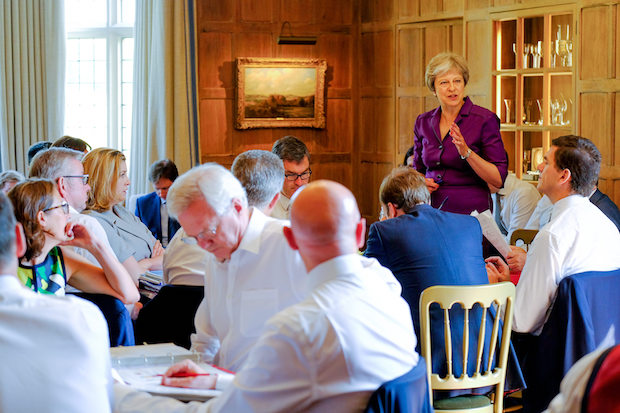Theresa May heads to Italy this weekend for her summer holiday with her Brexit proposals hanging by a thread. Not only has the Chequers plan divided her party, led to front bench resignations and talk of a ‘no confidence’ vote, Brussels don’t seem all that keen on it either. As James notes on Coffee House, Michel Barnier appeared to deal it a fatal blow in his joint press conference with Dominic Raab on Thursday.
The EU’s chief negotiator made clear that the UK collecting tariffs on behalf of the EU – a key plank of the proposal – was a non-starter:
‘The EU cannot and the EU will not delegate the application of its customs policy and rules and VAT and excises duty collection to a non-member who would not be subject to the EU’s governance structures.’
Brexiteer politicians critical of May’s plans were quick to latch onto Barnier’s comments as proof that Chequers isn’t worth the paper it’s written on. Despite this, Theresa May and her ministers are still down to tour the UK and EU over the summer in a bid to win both the public and EU leaders round to the plan. But is there any point? As we discuss on today’s Coffee House Shots podcast, it seems on the surface at least that the Chequers agreement is fighting for its life. Even if May had somehow got it through unchanged, it would have been a struggle to get enough MPs to vote for it. It’s clear that Brussels have no plans of letting it fly as is, so it will only be softened further. This means that it looks even harder to get through – unless May relied on a lot of Labour votes which is risky for two reasons: 1. could you trust the opposition to come through for you in a crunch vote? 2. It could lead to all out civil war in the Conservative party. No. 10 remain hopeful that the EU27 will prove more pragmatic and get the European Commission to change course. This seems optimistic. However, if you read Theresa May’s Brexit white paper more as a declaration of her plan to seek something closer to a Norwegian-style agreement with the EU than a Canada-style free trade deal, then it’s easy to see why Downing Street are still be keen for May to push the merits of it. Chequers could simply be – as many Brexiteers worried from the beginning – a staging post to an even softer Brexit. That said, the one thing the Prime Minister does seem to really still view as a red line in these Brexit talks is the need to end freedom of movement. If the EU insist that freedom of movement remains on the table in any final deal then it’s hard to see May signing up to that. In that scenario, it might not be the case that a ‘no deal’ is brought about through a backbench backlash, instead it could be No 10 reluctantly leading the plans.






Comments